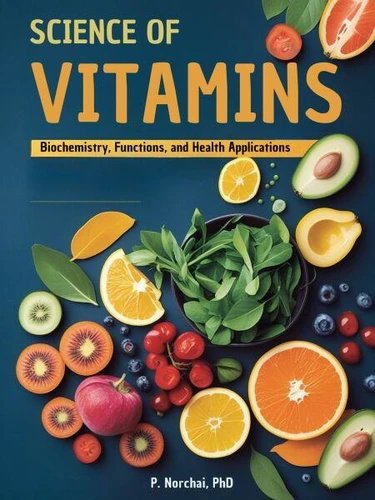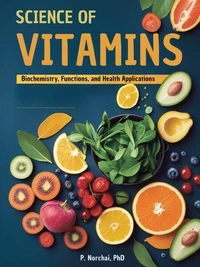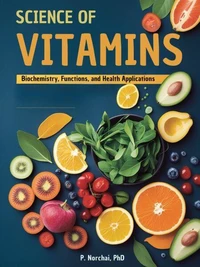- Accueil /
- Dr. Phitchakorn Norchai
Dr. Phitchakorn Norchai

Dernière sortie
SCIENCE OF VITAMINS:Biochemistry, Functions, and Health Applications
Science of Vitamins: Biochemistry, Functions, and Health Applications is a comprehensive academic resource that explores the essential world of vitamins with scientific depth, clinical relevance, and applied insight. Written for students, educators, researchers, and professionals in Food Science, Nutrition, and Health Sciences, this textbook offers a rigorous yet accessible journey into the biochemical and physiological roles of vitamins in human health.
From their historical discovery to their modern applications in food systems and public health, vitamins are at the core of nutritional science and preventive medicine. This book provides a structured and progressive approach, beginning with the classification, chemistry, and metabolism of vitamins and expanding into their functional roles in enzymatic processes, gene regulation, immune function, and disease prevention.
Each chapter is grounded in up-to-date peer-reviewed scientific research, making the content both academically robust and professionally applicable. Key topics include: The biochemical classification and structural chemistry of fat-soluble and water-soluble vitamins Mechanisms of absorption, transport, metabolism, and storage in the human body Recommended daily intakes (RDI, AI, UL) and global regulatory guidelines (WHO, EFSA, TGA) Roles of vitamins A through E in vision, immunity, antioxidant protection, and chronic disease modulation The impact of vitamin deficiencies and toxicities across life stages and populations Natural vs.
synthetic vitamins and their implications for bioavailability and food fortification Interactions with gut microbiota, genetics, food matrices, and pharmaceutical agents Future perspectives on personalized nutrition, nutrigenomics, and functional food innovation Designed to be both a teaching tool and a professional reference, this book bridges the gap between foundational science and real-world application.
Chapters are written with clarity and precision, integrating molecular biology, clinical nutrition, food processing technology, and public health policy. Special attention is given to the interaction between micronutrient science and global nutrition systems, emphasizing sustainability, equity, and scientific literacy. Whether you are a student preparing for a career in nutrition science, a healthcare provider seeking to deepen your understanding of micronutrients, or a food industry innovator working with fortified products and supplements, this book delivers the knowledge base and critical thinking framework needed to navigate the evolving field of vitamin science.
Science of Vitamins: Biochemistry, Functions, and Health Applications is not only an academic text-it is a forward-thinking guide to the vital role of vitamins in advancing human health, scientific innovation, and nutrition-based solutions for a healthier world.
From their historical discovery to their modern applications in food systems and public health, vitamins are at the core of nutritional science and preventive medicine. This book provides a structured and progressive approach, beginning with the classification, chemistry, and metabolism of vitamins and expanding into their functional roles in enzymatic processes, gene regulation, immune function, and disease prevention.
Each chapter is grounded in up-to-date peer-reviewed scientific research, making the content both academically robust and professionally applicable. Key topics include: The biochemical classification and structural chemistry of fat-soluble and water-soluble vitamins Mechanisms of absorption, transport, metabolism, and storage in the human body Recommended daily intakes (RDI, AI, UL) and global regulatory guidelines (WHO, EFSA, TGA) Roles of vitamins A through E in vision, immunity, antioxidant protection, and chronic disease modulation The impact of vitamin deficiencies and toxicities across life stages and populations Natural vs.
synthetic vitamins and their implications for bioavailability and food fortification Interactions with gut microbiota, genetics, food matrices, and pharmaceutical agents Future perspectives on personalized nutrition, nutrigenomics, and functional food innovation Designed to be both a teaching tool and a professional reference, this book bridges the gap between foundational science and real-world application.
Chapters are written with clarity and precision, integrating molecular biology, clinical nutrition, food processing technology, and public health policy. Special attention is given to the interaction between micronutrient science and global nutrition systems, emphasizing sustainability, equity, and scientific literacy. Whether you are a student preparing for a career in nutrition science, a healthcare provider seeking to deepen your understanding of micronutrients, or a food industry innovator working with fortified products and supplements, this book delivers the knowledge base and critical thinking framework needed to navigate the evolving field of vitamin science.
Science of Vitamins: Biochemistry, Functions, and Health Applications is not only an academic text-it is a forward-thinking guide to the vital role of vitamins in advancing human health, scientific innovation, and nutrition-based solutions for a healthier world.
Science of Vitamins: Biochemistry, Functions, and Health Applications is a comprehensive academic resource that explores the essential world of vitamins with scientific depth, clinical relevance, and applied insight. Written for students, educators, researchers, and professionals in Food Science, Nutrition, and Health Sciences, this textbook offers a rigorous yet accessible journey into the biochemical and physiological roles of vitamins in human health.
From their historical discovery to their modern applications in food systems and public health, vitamins are at the core of nutritional science and preventive medicine. This book provides a structured and progressive approach, beginning with the classification, chemistry, and metabolism of vitamins and expanding into their functional roles in enzymatic processes, gene regulation, immune function, and disease prevention.
Each chapter is grounded in up-to-date peer-reviewed scientific research, making the content both academically robust and professionally applicable. Key topics include: The biochemical classification and structural chemistry of fat-soluble and water-soluble vitamins Mechanisms of absorption, transport, metabolism, and storage in the human body Recommended daily intakes (RDI, AI, UL) and global regulatory guidelines (WHO, EFSA, TGA) Roles of vitamins A through E in vision, immunity, antioxidant protection, and chronic disease modulation The impact of vitamin deficiencies and toxicities across life stages and populations Natural vs.
synthetic vitamins and their implications for bioavailability and food fortification Interactions with gut microbiota, genetics, food matrices, and pharmaceutical agents Future perspectives on personalized nutrition, nutrigenomics, and functional food innovation Designed to be both a teaching tool and a professional reference, this book bridges the gap between foundational science and real-world application.
Chapters are written with clarity and precision, integrating molecular biology, clinical nutrition, food processing technology, and public health policy. Special attention is given to the interaction between micronutrient science and global nutrition systems, emphasizing sustainability, equity, and scientific literacy. Whether you are a student preparing for a career in nutrition science, a healthcare provider seeking to deepen your understanding of micronutrients, or a food industry innovator working with fortified products and supplements, this book delivers the knowledge base and critical thinking framework needed to navigate the evolving field of vitamin science.
Science of Vitamins: Biochemistry, Functions, and Health Applications is not only an academic text-it is a forward-thinking guide to the vital role of vitamins in advancing human health, scientific innovation, and nutrition-based solutions for a healthier world.
From their historical discovery to their modern applications in food systems and public health, vitamins are at the core of nutritional science and preventive medicine. This book provides a structured and progressive approach, beginning with the classification, chemistry, and metabolism of vitamins and expanding into their functional roles in enzymatic processes, gene regulation, immune function, and disease prevention.
Each chapter is grounded in up-to-date peer-reviewed scientific research, making the content both academically robust and professionally applicable. Key topics include: The biochemical classification and structural chemistry of fat-soluble and water-soluble vitamins Mechanisms of absorption, transport, metabolism, and storage in the human body Recommended daily intakes (RDI, AI, UL) and global regulatory guidelines (WHO, EFSA, TGA) Roles of vitamins A through E in vision, immunity, antioxidant protection, and chronic disease modulation The impact of vitamin deficiencies and toxicities across life stages and populations Natural vs.
synthetic vitamins and their implications for bioavailability and food fortification Interactions with gut microbiota, genetics, food matrices, and pharmaceutical agents Future perspectives on personalized nutrition, nutrigenomics, and functional food innovation Designed to be both a teaching tool and a professional reference, this book bridges the gap between foundational science and real-world application.
Chapters are written with clarity and precision, integrating molecular biology, clinical nutrition, food processing technology, and public health policy. Special attention is given to the interaction between micronutrient science and global nutrition systems, emphasizing sustainability, equity, and scientific literacy. Whether you are a student preparing for a career in nutrition science, a healthcare provider seeking to deepen your understanding of micronutrients, or a food industry innovator working with fortified products and supplements, this book delivers the knowledge base and critical thinking framework needed to navigate the evolving field of vitamin science.
Science of Vitamins: Biochemistry, Functions, and Health Applications is not only an academic text-it is a forward-thinking guide to the vital role of vitamins in advancing human health, scientific innovation, and nutrition-based solutions for a healthier world.
Les livres de Dr. Phitchakorn Norchai

MICRONUTRIENT PATHWAYS: From Soil to Supplement Shelf Exploring the Global Journey of Essential Nutrients
Dr. Phitchakorn Norchai
E-book
8,99 €

5,99 €

TECHNIQUES IN FOOD MICROBIOLOGY: Innovations in Pathogen Control and Fermentation
Dr. Phitchakorn Norchai
E-book
5,49 €

THE VITAL MATRIX: Unlocking the Power of Vitamins, Food, and Lifestyle
Phitchakorn Norchai, Dr. Phitchakorn Norchai
E-book
4,49 €

FUNCTIONAL CARBOHYDRATES AND STARCHES: Unlocking the Power of Cereal Crops
Dr. Phitchakorn Norchai
E-book
8,99 €

THE SCIENCE AND TECHNOLOGY OF MILK:Composition, Processing, and Health Benefits
Dr. Phitchakorn Norchai
E-book
8,99 €

8,99 €

SUPPLEMENTS IN THE REAL WORLD: Bridging Science, Society, and Health Policy
Dr. Phitchakorn Norchai
E-book
8,99 €

THE SCIENCE OF FOOD PROCESSING: Techniques and Trends in Modern Food Technology
Dr. Phitchakorn Norchai
E-book
8,99 €

SMART HEALTH CHOICES: Navigating the World of Supplements with Science
Dr. Phitchakorn Norchai
E-book
8,99 €

ADVANCES IN SENSORY SCIENCE: Bridging Consumer Preferences and Food Innovation
Dr. Phitchakorn Norchai
E-book
8,99 €

MICROORGANISMS IN FOOD SCIENCE, SAFETY, AND MANAGEMENT: A guide to food microbiology and modern safety systems
Dr. Phitchakorn Norchai
E-book
8,99 €

Nutritional Food Chemistry: Understanding Food's Impact on Human Health
Dr. Phitchakorn Norchai
E-book
8,99 €

17,49 €
